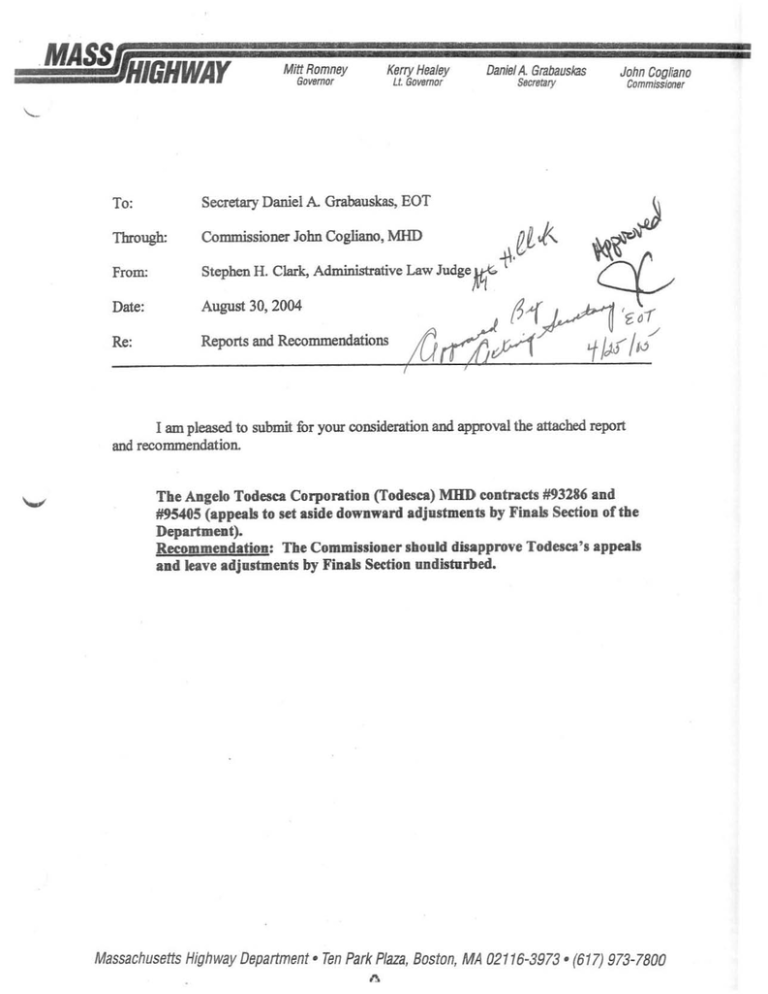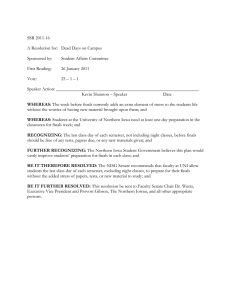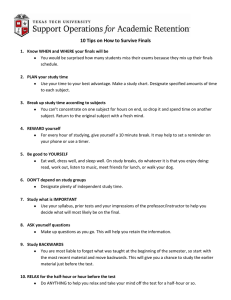/U W -d ei..K
advertisement

Min
Romney
GiI.._
Kerry Healey
Daniel A. Grabauskas
s.cr..,y
H Governor
Secretary Daniel A Grabauskas, EOT
Through:
Commissioner John Cogliano, MHD
From.:
Stephen H. Clark, Administrative Law Judge
Re:
August 30, 2004
Reports and Recommendations
/U
CommlsskHlfr
~
To:
Date:
John CO(Jliano
ei..K
.
W11
~'('-fl'
~
-d
&1~ 'f~-r
~
~ /.is' /1/
..
I am pleased to submit fur your consideration and approval the attached report
and recommendation.
The Angelo Totiesca Corpontion (Totiesca) MHO ..,nlnlets #93286 and
1195405 (appeals to set ..ide downward adjustments by Finals Section of tbe
Department).
Recommendation: Tbe Commissioner should disapprove Todesca's appeals
and leave adjustments by Finals Seelion undisturbed.
Massachusetts Highway Depal1ment· Ten Park Plaza, Bastan, MA 02116-3973· (617) 973-7800
To:
Seaetmy Daniel A. Grab."slcps, EOT
Through:
Commi·sio"... John CogliaDo, MHD
From:
Stepbon H. Clark, Administrative Law Judge
Date:
August 30, 2004
Re:
Reports and RccoIlll!leIldations
el.f.­
Aft-{I,
I am pleased to submit fur your oonsideraIiDn and approval tbc attach'" rqxlrt
and rocoIlll!leIldation.
no Aacelo Tod.... CorporatioD (fod...,.) MHD CODtraell 1932'16 ud
"'5.05 (.ppeolo ~ let uido do......ud .dJ_.... by Fi..11 800!iOD oftlte
Departmeat).
!'!'P'...cIatioJ; no Commlplo.er ..0 .... dilappnwe Tod...,,', .ppeolo
..d leave . d J . _ " by FiuII Sec:tioD IUIdlstartJed.
Massachusetts Highway Department· Ten Park Plaza, Boston. MA 02116-3973 • (617) 973-7800
"
INTRODUCTION
The Angelo Todesca Corporation (Todesca), aggrieved by the determination of
the Finals Section of the Massachusetts Highway Department (Department) reducing the
final estimates of Contracts #93286 and #95405, appealed.
I conclude that Todesca failed to provide a “valid written” reason for challenging
the adjustments made by the Finals Section as the contracts required. I also conclude that
Todesca offered no substantial evidence that tended to show that the Finals Section’s
adjustments to the final estimates were incorrect. There was therefore no substantial
evidence presented at the hearing that would support disturbing the adjustments made by
the Finals Section. I recommend that the Secretary disapprove Todesca’s appeals and
that the final estimates for contracts #93286 and #95405, as adjusted by the Finals
Section, be confirmed.
CONTRACT #93286
1.
Background
Contract #93286 involved the reconstruction of part of Washington Street in
Boston. The Contract was entered into on December 22, 1992. The completion date—as
extended by the Department—was July 31, 1994.
The final estimate for the Contract was dated July 31, 1994. After making various
quantity and item adjustments to the final estimate, on June 30, 1997 the Finals Section
of the Department signed the final estimate. On January 8, 2001 Todesca informed the
Department “after reviewing these finals [for contracts 93286, 95405 and three others]
we are disputing the figures arrived at.” Thereafter, on February 28, 2001, Todesca filed
a Statement of Claim in which it stated the basis of its claim was “engineer & contractor
agreed with last estimate figures & quantities.” In response to a question in the Statement
of Claim seeking a breakdown of how the amount of its claim was computed, Todesca
stated “Total value of work completed per final estimate.” Todesca’s claim failed to state
a dollar amount.
A hearing was held on Todesca’s claim on August 12, 2004. Present and
participating in the hearing were
Stephen H. Clark
Isaac Machado, Esq.
Harold M. Kane
Chief Administrative Law Judge
Deputy Chief Counsel
Todesca
The following documents were admitted as exhibits in evidence:
Ex.#1
Ex.#2
2.
Statement of Claim
Final Estimate, as approved 6/30/97
Findings of Fact
The Department objected to Todesca’s Statement of Claim because it did not
specify the payment items adjusted by the Finals Section in dispute.
The final estimate approved by the Contract resident engineer, showed the total
value of work done to be $3,263,187.67; however, the total value approved by the Finals
Section after reviewing the resident engineer’s final estimate was $3,255,196.90. Ex. #2.
I find that, as a result of the Finals Section review, the Department over paid Todesca
(before credit for retainage of $5,000) by $7,990.77. I find that Ex. #2 shows that
Todesca owes the Department $2,990.77 net of retainage.
At the August 12, 2004 hearing Todesca offered no documents in evidence. It
relied solely on the oral testimony of Mr. Kane, an accountant. Mr. Kane stated the
Todesca disputed three adjustments the Department made to Contract quantities and
sought an explanation at the hearing why the Department made them, to wit: a reduction
2
in Item 120.1 (unclassified excavation) of 147 CY; a reduction in Item 141 (Class A
trench excavation) of 30CY; and a reduction in Item 206.01 (drop inlet) of 4 items.
Todesca “questioned” these adjustments, but introduced no evidence to show about
whether the adjustments were warranted or what the correct quantities were. Instead,
Todesca relied on the quantities as measured by the resident engineer as correct. Todesca
offered no contract value of the reductions it questioned. However, based on Ex. #2, I
find that the total of all quantity reductions have a contract value of $1,133.
Todesca also disputed and “questioned” the Finals Section’s adjustments to pay
items related to paid police details. Mr. Kane sought an explanation from the Department
for the adjustment that reduced the sergeant rate downward to the patrolman’s rate. Mr.
Kane said that Todesca had been “compelled” to pay the higher sergeant rate. Mr. Kane
questioned whether the Department incorrectly refused to pay the administrative fee
charged by the Boston Police Department. Mr. Kane testified that payment of the
administrative fee charged by the Boston Police Department was discontinued as of May
1, 1993 by a directive of the Department. Mr. Kane’s testified that he knew of that fact
from an internal Todesca document, not produced at the hearing, relating to another
Department contract. Mr. Kane testified that the Department’s directive “suggests” that
“at some point in time” the resident engineer would have discontinued the fee. Although
Mr. Kane did not specifically so testify, I find that the value of these challenged
adjustments to be approximately $6,444, if accepted.
Cross-examination of Mr. Kane by the Department, established the following
additional facts. Prior to the August 12, 2004 hearing Todesca gave the Department no
notice in writing of the substance of Todesca’s claim. Mr. Kane was not employed by
3
Todesca at the time of the Contract work. Mr. Kane had no personal knowledge of the
administration of the Contract or the Contract quantity items adjusted by the Finals
Section. Mr. Kane had had “general discussion” with Todesca personnel about the
Contract. He had not seen the directive of the Department concerning Boston police
detail administrative fees. Mr. Kane did not review the Contract or any records kept by
Todesca before he testified. He testified that the basis for contesting the Department’s
adjustments was “the moral principle” that once the Department has approved and the
contractor has paid for something (and can not recover the money it has paid) the
Department “can’t take it back.”
The Department called no witnesses. It represented that the project records for
Contract #93286 could not be located. It submitted the final estimate as approved by the
Finals Section to prove the correct Contract quantities and payments. Ex. #2.
For the reasons stated infra at pages 10-12, I conclude that Todesca failed to meet
its burden of persuasion because it introduced no substantial, credible evidence that the
adjustments made by the Finals Section were incorrect.
CONTRACT #95405
1.
Background
The work under Contract #95405 was for improvements to a 9.24-mile section of
Route 58 in Carver. The Contract was entered into March 21, 1995. The completion
date-as extended by the Department—was October 30, 1995.
The final estimate for the Contract was dated October 30, 1995. On September 9,
1996 the Finals Section signed the final estimates, after first making various quantity
adjustments. Ex. #3. Todesca notified the Department on January 8, 2001 that “after
4
reviewing these finals [for contracts #93286 and 95405 and three others] we are disputing
the figures arrived at.” On February 28, 2001 Todesca filed a Statement of Claim, the
basis of which was that the “resident engineer and the contractor agreed on final
quantities” and that “total value of work performed per final estimate.” Todesca’s
Statement of Claim did not specify a dollar amount.
A hearing was held on Todesca’s claim on August 12, 2004. Present and
participating in the hearing were
Stephen H. Clark
Isaac Machado, Esq.
Richard Brodeur
Harold M. Kane
Chief Administrative Law Judge
Deputy Chief Counsel, MHD
District #5 Finals Engineer
Todesca
The following documents were admitted into evidence as exhibits.
Ex. #1
Ex. #2
Ex. #3
2.
Contract #95405
Todesca Statement of Claim
Final Estimate, as approved 9/9/96
Findings of Fact
The Department objected to Todesca’s Statement of Claim because it did not
specify the payment items adjusted by the Finals Section in dispute.
The final estimate approved by the Finals Section shows the total value of work
done to be $765,839.71. Ex. #3. The total value of shown on the last estimate approved
by Contract resident engineer’s last estimate was $774,121.15. This results in an over
payment of $8,281.44 before credit for retainage of $1,935.30. I find that, as a result of
the Finals Section review, the Department over paid Todesca (before credit for retainage
of $1,935.30) $8,281.44. I find that after the adjustments made by the Finals Section
Todesca owes the Department $6,346.14. Ex. #3.
5
At the August 12, 2004 hearing Todesca offered no documents in evidence. It
relied on the oral testimony of Mr. Kane. Mr. Kane testified that Todesca questioned the
adjustments the Finals Section made relating to police details and bituminous cement.
Mr. Kane questioned why the Finals Section made a downward adjustment of 230-240
man-hours of police detail work, which had the effect of reducing the Contract’s
compensation for police details by approximately $7,300 to $7,400. Mr. Kane offered no
affirmative evidence pointing to how police details should have been paid under the
Contract or why the adjustment of the detail hours by the Finals Department was
incorrect.
Mr. Kane also “questioned” the adjustment of the Finals Section that netted out
the application of a price adjustment factor for bituminous concrete in extra work of berm
resurfacing that was paid for on a unit basis. Mr. Kane offered no documents or
testimony to show how the price adjustment factor should be applied under the Contract.
Cross-examination established these facts. Mr. Kane was not personally familiar
with the Contract work or the administration of the Contract. He had no knowledge of
the police detail payment requirements or the extra work order for berm resurfacing. He
had no knowledge of the time slips kept by Todesca as back up for the hours worked by
police details and admitted he did not know if such slips were produced at the time of
initial payment. Mr. Kane did not work for Todesca at the time the price adjustment
factor was in use. He did not know that an extra work order for berm resurfacing existed
until Department officials informed him at a conference on the day of the hearing. He
had no personal knowledge about the extra work order or the work done under it. His
basis for the testimony that the price adjustment factor applied to the unit price stated in
6
the extra work order was that once the extra work order became part of the Contract, the
price adjustment applied to it. Mr. Kane offered no reference to the Contract or anything
else as support for that conclusion. Mr. Kane admitted that he was not present when the
extra work order for the berm resurfacing was executed and could not “assess” the price
negotiation that took place at the time.
The Department called Mr. Richard Brodeur, District #5 Finals Engineer. He
testified that the Department had originally paid for certain concrete used in the extra
work of berm surfacing incorrectly, since it had applied the adjustment factor. He
testified the Finals Section correctly adjusted the final payment to reflect the fact that the
unit price in the extra work order was a negotiated unit price for all the work stated in the
extra work order.
For the reasons stated infra at pages 10-12, I conclude that Todesca failed to meet
its burden of persuasion because it introduced no substantial, credible evidence that the
adjustments made by the Finals Section were incorrect.
DISCUSSION
THE TODESCA APPEALS
Because common procedural and substantive issues are raised in the appeals from
the determinations of the Finals Section in both Contract #93286 and #95405 (Contract) I
address the two appeals together.
The Contract provides in Subsection 9.05 (“Final Acceptance and Final
Payment”) that “All prior partial estimates and payments shall be subject to correction in
the final estimate and payment.” Pursuant to Subsection 9.05 the Finals Section in fact
7
made adjustments relating to the final estimates initially agreed upon by the resident
engineer and Todesca in 1994 (#93286) and 1995 (#95405).
Subsection 9.05 also provides
If within six months from the date the final estimate is forwarded to the
Contractor, the Contractor has not filed a valid (as determined by the
Engineer) written reasons(s) for not accepting the final estimate, the final
estimate will be considered acceptable to the Contractor and payment of
the final estimate made.
The evidence did not establish the date when the final estimates as adjusted by the
Finals Section were sent to Todesca for either contract #93286 or #95405. It is thus not
possible to know whether the final estimate was forwarded to Todesca “within six
months.” For both contracts, however, Todesca gave a Notice of Appeal under
Subsection 7.16 on or about January 8, 2001. It filed its respective Statements of Claim
with the Board of Contract Appeals on February 28, 2001.
In neither Notice of Appeal nor Statement of Claim did Todesca specify any basis
for its appeal other than the fact that it had agreed with the resident engineer on the
quantities submitted in the final estimate. Contract #93286, Ex# 2; Contract #95495, Ex.
3. At the August 12, 2004 hearings Todesca’s witness reiterated that the basis for
Todesca’s appeals was the agreed upon “last estimate figures and quantities.”
I assume here that Todesca both timely filed its appeals and supplied a “written”
reason in its two statements of claim. However, that is not the end of the analysis
required because the Contract requires that Todesca file “a valid … written reason for not
8
accepting the final estimate.” 1 The question for decision thus becomes whether the
written reasons filed were “valid.”
At the hearings the Engineer, through Department counsel, contested the validity
of the written reasons advanced by Todesca for both contracts. The Department objected
to the overly general nature of Todesca’s statements of claim. One result of that fact was
that the Department only learned at the August 12, 2004 hearings that Todesca had any
specific issues—namely, how police detail payments were accounted for and why the
Department made certain quantity adjustments. The issues raised by Todesca at the
hearing were never reduced to writing. The Department argued in substance that
Todesca’s statements of claim did not constitute “valid written” reasons for not accepting
the final estimates.
I agree with the Department. The general statement that the “[Department
resident] engineer and contractor agreed with last estimate figures and quantities” is not a
valid written reason for contesting the adjustments made.
Subsection 9.05 of the Contract provides that the Department had the right to
correct “all prior partial estimates and payments.” In both contracts at issue the
Department acted under the Contract to do just that. Todesca had no expectation under
the Contract that the preliminary final estimate figures submitted in concert with the
resident engineer would not be subsequently adjusted. Because Subsection 9.05
envisioned that the preliminary final estimate would be adjusted, Todesca could not rely
on the preliminary final estimate figures as the sole basis to contest the determinations of
the Finals Section. Cf. J. F. White Contracting Company v. Massachusetts Bay
1
Subsection 7.16 states that an appeal of the Engineer’s determination should “set forth … the amount of
the claim (and breakdown of how [the] amount was computed) [and] a clear concise statement of the
specific determination from which appeal is taken ….”
9
Transportation Authority, 40 Mass. App. Ct. 937, 938-939 (1996) (rescript) (the terms of
the contract precluded contractor from relying on Department furnished estimates).
Merely reciting that it agreed with the unadjusted preliminary final estimate in these
circumstances did not set forth a valid reason for an appeal.
Because Todesca did not state any “valid written” reason for its appeal, it did not
comply with the requirements of Subsection 9.05 in appealing the final estimates as
adjusted by the Finals Section. Todesca’s failure to follow the remedies set forth in the
Contract precludes relief. See Glynn v. Gloucester, 9 Mass. App. Ct. 454, 461 (1980)
(failure to follow the remedies set forth in the contract preclude all relief).
TODESCA’S EVIDENCE
As the party seeking to appeal from the determinations of fact that the Contract
permits the Department to make, Todesca carries the burden of persuasion. See General
Electric Co. v. Board of Assessors of Lynn, 393 Mass. 591, 598 (1984) (burden of
persuasion is from the outset on one party; presumption of validity of government’s
administrative action means challenging party has burden of proving the contrary). In
these appeals Todesca had the burden to present evidence to persuade the trier that the
Department’s adjustments were for some reason incorrect. It failed to meet that burden.
Todesca’s sole evidence concerning contract quantities was the oral testimony of
its witness Mr. Kane.
With respect to #93286 Mr. Kane offered no affirmative evidence that the
quantity adjustments made were incorrect. Todesca could not shift its burden of
persuasion onto the Department by appearing at the hearing to ask the Department to
explain why it made certain quantity adjustments.
10
Mr. Kane testified that according to an internal memorandum the Department
would not pay the administrative fee of the Boston Police Department after May 1, 1993.
He provided no facts concerning the pay of patrolman and sergeant rates for police
details. He testified that once payment had been made by Todesca the Department had a
“moral obligation” to reimburse, as Todesca could not recover money paid to Boston.
Detracting from the substance of his testimony were the facts that Mr. Kane had
no personal knowledge of Todesca’s work or the administration of the contract. He was
not employed by Todesca during the times at issue. He had no personal knowledge of the
contract quantities, preliminary or final, as agreed to by Todesca and the resident
engineer or as adjusted by the Finals Section. On the police detail issues, Mr. Kane did
offer any document to support his contention that there was a Department directive that
altered the payment of administrative fees. He did not refer to any provision in the
Contract provision that governed the payment of police details. He relied on an internal
Todesca document not offered in evidence as the basis for his testimony.
I find Mr. Kane’s testimony concerning the adjustments made in contract #93286
unsupported, speculative and unreliable. The factors detracting from the substance of
Mr. Kane’s testimony—the lack of personal knowledge, the lack of familiarity with
Todesca’s documents, the lack of knowledge of the contract work, lack of any documents
relating to police detail payments—outweigh the probative value of his testimony. I find
that Mr. Kane’s testimony did not offer any facts upon which the trier could support a
conclusion that the Finals Section made any error in adjustments made to contract
#93286.
11
With respect to contract #95405, Mr. Kane offered no credible evidence. He
offered no testimony at all concerning the adjustments made to police detail
reimbursements. With regard to the adjustment that backed out the preliminary
estimate’s payment based on the price adjustment factor for bituminous concrete used in
the extra work order, Mr. Kane offered no testimony based on personal knowledge or
from knowledge of the Contract or records kept by Todesca with respect to it (including
the terms of the extra work order). He had no knowledge of the extra work order or unit
price negotiations. In sum, Mr. Kane’s testimony on the issues raised on contract #95405
was not credible. He offered no substantial evidence that could support a finding that the
Finals Section made a mistake.
I conclude that Todesca failed to support by substantial, credible evidence its
contentions that the preliminary final estimates in #93286 or #95405 were correct. I
conclude on this record that Todesca failed to meet its burden of persuasion in both
appeals. There simply is no substantial evidence on this record to support the conclusion
that the Finals Section made a mistake.2 The adjustments made to the final estimates in
both contracts by the Finals Section should stand as made.
FINDINGS
I find that Todesca failed to follow the remedy set forth in the Contract for not
accepting the final estimate on Contract #93286 and Contract #95405. I find that
2
Substantial evidence “is such evidence as a reasonable mind might accept as adequate to support a
conclusion.” New Boston Garden v. Assessors of Boston, 383 Mass. 456, 466 (1981). “The substantiality
of evidence must take into account whatever in the record fairly detracts from its weight.” Id. Here, the
record as a whole shows that Mr. Kane’s statements concerning police detail accounting were not
supported and his statements doubting the adjusted quantities of materials used by the Department had no
basis in fact.
12
Todesca offered no substantial evidence on which a decision to allow its appeal could be
based.
RECOMMENDATION
The Commissioner should adopt the findings of fact set forth above.
I recommend that Todesca’s appeal be disapproved and that the Department’s
final estimates, as respectively approved with adjustments on June 30, 1997 for contract
#93286 and on September 9, 1996 for contract #95405, be made final.
Respectfully submitted,
Stephen H. Clark
Administrative Law Judge
Dated: August 30, 2004
13


